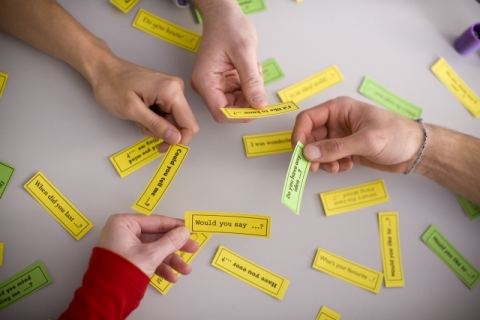Games For Language Teaching and Learning

Language learning can be a hard task and sometimes it can be frustrating. Continuous effort is required to properly understand, pronounce and manipulate a new language. Well-chosen games whether it’s online or offline, are one of the best ways to learn the target language. Now, the time is of online learning. There are many games available on the internet by which you can teach and learn a new language and lots more things. Games help the teacher to make circumstances in which the language is effective and expressive. Although the games are often related to fun yet we should not avoid their academic value, especially in a new language teaching and learning. Games are very effective tools for teaching and learning a new language because they create motivation, lower stress for students, and provide the opportunity for real communication to learners.
We can divide language games into 2 categories- linguistic and communicative games. Linguistic games emphasis on accuracy, for instance, it provides the right synonyms and antonyms while communicative games presume successful interchange of information and ideas. Actually, games have a excessive academic value and it can be used in the classroom to make learners use the language in place of thinking about learning the right forms. Games inspire learners to work together, be creative, cooperative and impulsive in using the language in a significant way. Students want to participate in activities to play games and are normally relatively competitive.
Benefits of Using Games in the Language Learning
Games are used as a technique or method to engage learners in learning a new language with fun and easy. Well selected and premeditated games are helpful as they provide learners a break and simultaneously allow them to practice language skills. The benefits of games from the perceptive feature of learning to more co-operative group dynamics and as a result games are very motivating at the same time challenging.
These are some advantage of using games in teaching and learning:
1. More Motivation
Playing games in the classroom increase motivation, students become more motivated to learn, pay attention and take participate in the task. Games enable students to become a part of the team and take responsibility for their own learning. They can also be used as a classroom management tool to motivate a class.
2. Spirit of Competitiveness
Games inspire the student to be more competitive in the classroom. Games are a great way to control the competitiveness of peers. With the spirit of competitiveness, it has been easy to learn a new language. Students talk to each other during their language learning activities.
3. Improve Memory

Learning with a range of language learning specific games can improve your memory. While playing a game, students need to remember important information about a specific topic and also use their working memory to think and act swiftly.
4. Class Cooperation
With learning, games are also increasing cooperation in the classroom. Students’ play language learning games with whole class or teacher or small groups, it teaches them to listen to others, build respect and play fairly. Games are used as a team-building exercise by teachers.
Some Games for Language Learners
For memorizing vocabulary words and mastering your grammar, here is a list of some best language learning games:
1. Language by Lyrics
Memorizing words and phrases in your target language is easier with the help of rhyme and rhythm. With this fun app, you can select songs in the language of your choice, see the translated lyrics and learn to sing along.
2. Star Languages
For more advanced and comprehensive practice, this app allows you to choose from a variety of learning games like crosswords, spelling tests, and hangman. In this game, you can apply your knowledge of vocabulary, spelling, sentence structure and more.
3. Vocabulary Games
There are a huge number of vocabulary games available on the internet. These vocabulary games are a great way to enhance your memory skills. You can choose from a large variety of games comprising Unscramble, Letter Blocks, and Slang Game. You can learn a new language from anywhere at a laptop, a mobile or a tablet.
4. Lingo Arcade
This app is perfect for those learners who like visual learning. It will help you to identify words and sentence structure with more than 3000 visual aids.
5. Scrabble
It is a fantastic way to practice your spelling and vocabulary skills. You can join a friend in this fun learning game. Different lettered tiles are placed on a board to form new words. The app is available in different languages and keeps you motivated while you learn.
6. Drops
With this application, you get an opportunity to test your knowledge of vocabulary by matching words and swiping as you learn. As you increase your speed and accuracy, you will find more new and advanced words.
7. Guessing Games
These games can support language learners practice making yes or no type questions. The students can work or in groups. The teacher provides one student a character, the other students can ask 20 yes/no questions to figure out who the person is.
8. Search Games
These games give the opportunity to practice providing and seeking information in the target language. During these types of games, each student has a chart and with a set of categories. For example, musician, an athlete, vegetarian, multilingual etc. They need to walk around and ask questions until they have a name under each category.
In short, games are proven to be a useful tool in teaching and learning language. Games motivate learners and create a friendly atmosphere, the objective of games is to develop all language skills. As a result, games can inspire, promote interaction of learners, improve their acquisition and increase their achievement. Games are based on specific time limit and have a clear relevance to the material and thus the enjoyment of the learners is increased ultimately through their active involvement with the language. Games are entertaining, lower anxiety levels, educational and give reasons to use the target language to learners.
Need Help with Your Assignment?
Get expert guidance from top professionals & submit your work with confidence.
Fast • Reliable • Expert Support
Upload NowOther Assignments